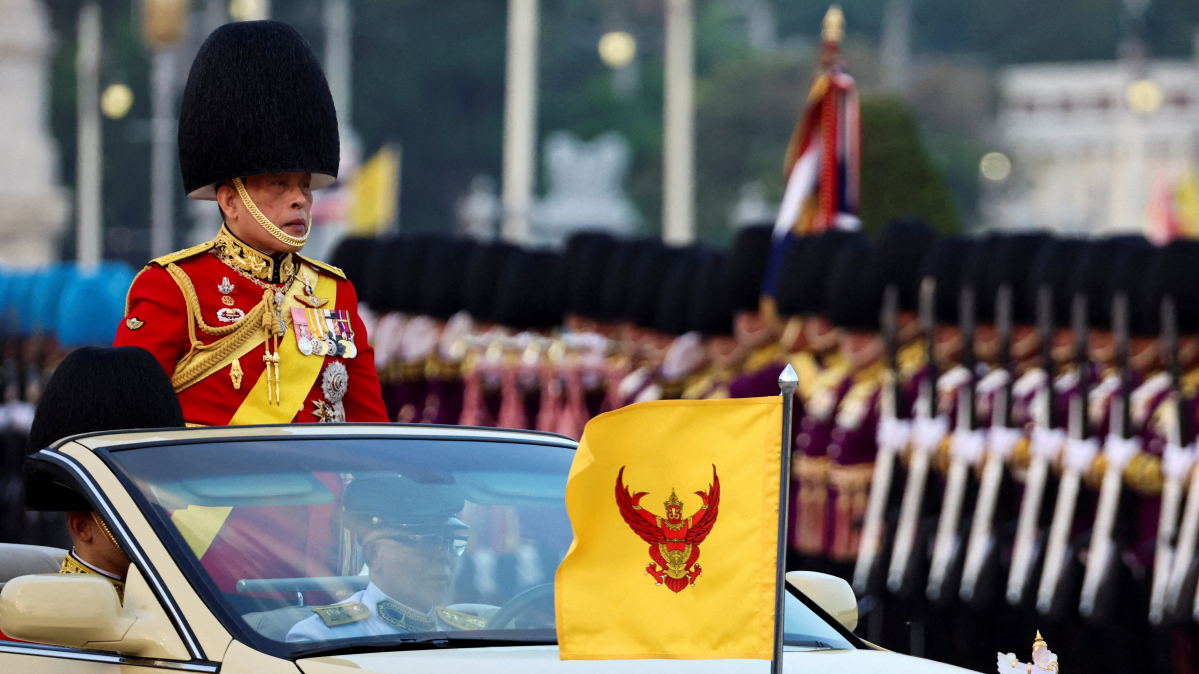Astronomers observe a star that quietly transformed into a black hole
The formation of a black hole can be quite a violent event, with a massive dying star blowing up and some of its remnants collapsing to form an except...

King Maha Vajiralongkorn will make history on Thursday as the first reigning Thai monarch to visit China. The visit signals China’s growing influence in Thailand, with both countries strengthening their diplomatic and economic ties.
A constitutional monarchy since 1932, Thailand has used royal visits as foreign policy tools, including two U.S. trips by King Vajiralongkorn's father, King Bhumibol Adulyadej, during the height of the Cold War in the 1960s.
Beijing and Bangkok established diplomatic relations in 1975 and their bilateral ties have evolved from the post-Cold War years, with a significant expansion in two-way trade and investment.
China is the largest import market for Thailand, which shipped in Chinese goods worth $80 billion last year, as well as a top source of visitors for its vital tourism sector and a major investor in industries such as automobiles.
Migration from China to Thailand also spans centuries, and many Thai families, including captains of industry, business and politics, have Chinese ancestry.
"Thailand and China share a special bond, we see them as siblings and they see us as family," said former Thai foreign minister Tej Bunnag, who also served as ambassador to Beijing.
In a statement announcing the visit by King Vajiralongkorn and his wife Queen Suthida, the Thai government said it was a reflection of "the deep-rooted friendship and mutual understanding shared between Thailand and China at all levels."
In Beijing, the king is scheduled to meet with Chinese President Xi Jinping and Premier Li Qiang, although no agreements are expected to be signed between the two countries.
Since his ascension to the throne in 2016, King Vajiralongkorn has only made one official trip abroad, to Bhutan in April.
"China is the first major country which His Majesty King Maha Vajiralongkorn officially visits," Chinese Foreign Ministry spokesperson Mao Ning said in a briefing last week.
"This fully demonstrates the great importance that the two sides attach to growing bilateral relations."
Despite invitations, the late King Bhumibol - who spent seven decades on the throne - did not visit China. Instead, he sent representatives, including the current king when he was Crown Prince in 1987, said Sitthiphon Kruarattikan, an international relations scholar at Bangkok's Thammasat University.
"Look at all the countries that China has diplomatic relations with, the heads of states of most of those countries have been to China, with Thailand an exception for a long time," he said.
"To have a reigning Thai monarch visiting, this is what the Chinese wanted," Sitthiphon said.
The visit comes during an official mourning period just weeks after the death of the king's mother, signifying the importance the royal court gives to Beijing.
As in other parts of Southeast Asia, China has grown increasingly assertive in Thailand, pressing the government to intensify efforts against cross-border cyber scams and repeatedly discouraging the legalisation of gambling, citing concerns about the possible impact on Chinese tourists.
In February, Beijing also succeeded in persuading the Thai government to deport 40 Uyghurs in detention in Bangkok, an issue that had been stalled for a decade.
Although a robust long-term relationship with China is vital, Thailand must also look out for its own interests, said former foreign minister Tej.
Thai officials have flagged the flare-up in trade tensions between the United States and China as a big risk to Southeast Asia's economy.
"China is a big country and they look at things at a global level," Tej said.
"We are a small country in Southeast Asia and we have to maintain a balance in our foreign relations."
Greek Prime Minister Kyriakos Mitsotakis arrived in Ankara on Wednesday, where Turkish President Recep Tayyip Erdoğan held an official welcoming ceremony at the Presidential Palace, marking the start of high-level talks between the two NATO allies.
A senior adviser to Iran’s Supreme Leader said on Tuesday that negotiations with the United States must remain focused on the nuclear issue and be grounded in realism, as Washington and Tehran prepare to resume talks mediated by Oman.
James Van Der Beek, who rose to fame as Dawson Leery in the hit teen drama Dawson’s Creek, has died aged 48 following a battle with stage 3 colorectal cancer.
Canadian Prime Minister Mark Carney said a bridge project linking Canada’s Ontario province with the U.S. state of Michigan would contribute to cooperation between the two countries.
U.S. President Donald Trump and Prime Minister of Israel Trump hosted Netanyahu for closed-door talks focused on negotiations with Tehran, Gaza and wider rBenjamin Netanyahu ended a two-and-a-half-hour meeting at The White House on Wednesday without reaching agreement on how to move forward on Iran.
Medical group accuses paramilitary force of targeting civilians in al-Kurqal area, urges international action to protect residents.
Day 6 of the Milano Cortina 2026 Winter Olympics brought fans and photographers unforgettable moments of athleticism, determination and sheer joy. From the ice rinks of Milan to the snowy slopes of Livigno, athletes pushed themselves to the limit delivering breathtaking performances.
U.S. border chief Tom Homan said on Thursday (12 February) a federal immigration crackdown in Minnesota will end after months of raids that led to more than 4,000 arrests, mass protests and two fatal shootings.
Norwegian police searched the homes of former prime minister Thorbjørn Jagland on Thursday (12 February) as part of an ongoing investigation into alleged ties between prominent Norwegians and the late U.S. sex offender Jeffrey Epstein, authorities and media reports said.
North Korean leader Kim Jong Un has chosen his teenage daughter as his successor, South Korea’s spy agency told lawmakers on Thursday.
You can download the AnewZ application from Play Store and the App Store.

What is your opinion on this topic?
Leave the first comment